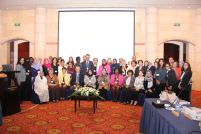 The meeting was inaugurated by Her Royal Highness Princess Muna Al-Hussein, WHO Patron for Nursing and Midwifery in the Eastern Mediterranean Region, and Dr Ala Alwan, WHO Regional Director for the Eastern Mediterranean (front, fourth from left).The WHO Regional Office convened a consultation on nursing education to review and update the present regional standards for nursing education and the prototype curricula for technical and professional nursing education which took place from 29 September to 1 October 2013, Amman, Jordan. This work is a major contribution to developing a balanced, motivated, well-distributed and managed health workforce with the appropriate skills mix.
The meeting was inaugurated by Her Royal Highness Princess Muna Al-Hussein, WHO Patron for Nursing and Midwifery in the Eastern Mediterranean Region, and Dr Ala Alwan, WHO Regional Director for the Eastern Mediterranean (front, fourth from left).The WHO Regional Office convened a consultation on nursing education to review and update the present regional standards for nursing education and the prototype curricula for technical and professional nursing education which took place from 29 September to 1 October 2013, Amman, Jordan. This work is a major contribution to developing a balanced, motivated, well-distributed and managed health workforce with the appropriate skills mix.
Selected deans of nursing institutes, experts in nursing and midwifery education, selected members of the Regional Advisory Panel on Nursing, Chairperson of the Global Advisory Group on Nursing and Midwifery, representatives of the WHO collaborating centres for nursing in the Region, selected chief nursing officers from Member States, a representative of the Scientific Society of Arab Faculties of Nursing and International experts participated in the above meeting.
Her Royal Highness commended the Regional Advisory Panel for its tireless effort to ensure that the populations in the Region have access to competent nurses and midwives capable of meeting national health priorities. Her Royal Highness also highlighted the fact that nurses and midwives provide care under difficult situations. Nurses and midwives needed to be better prepared at all levels and supported by institutionalized regulation and standards. She also noted that there was a general expansion of schools without increasing the number of teachers. WHO first set of education standards and prototype curricula have been used extensively in improving quality of education.
Dr Alwan highlighted that the existence of regional standards for nursing education in the 15 years is commendable. This meeting is therefore timely as the focus is on the review; updating of the regional standards for nursing education and the prototype macro-curriculum for pre-service nursing education, and the development of a framework for nursing specialization. He also highlighted the importance of NCDs and the contribution nurses can make to strengthen health systems.
The meeting was participatory in nature, with plenary sessions with key presentations, group work and discussions. The agenda was arranged around to cover three components: regional nursing education standards, prototype curricula for pre-service nursing education and nursing specialization.


